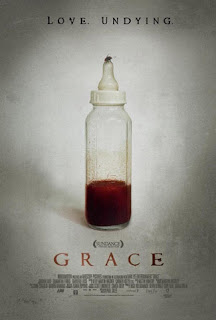Takashei Miike has over 80 directing credits on his IMDB resume, yet embarrassingly enough, I've seen three including today’s review. What I realized after watching The Happiness of the Katakuris is that, while I don’t hold this or the infamous Audition to be perfect, both demonstrate that Miike is a director in the truest sense of the word, with a strong point of view and a great control over tone. Compare the slow, creepingly haunting feel of Audition with the jubilant, quirky joy of The Katakuris and you have a prime example of distinctly different, yet equally well-executed films unlike any other.
Quick Plot: The Katakuris, a somewhat dysfunctional Japanese family, are trying to make a living running a hotel located near what is supposed to eventually be a major highway. Business is tough, but their personal lives are much worse: father is struggling to build a new life after being laid off, mother is trying to help, son Masayuki is a recent ex-con, daughter Shizue falls in love too easily, and grandfather is exasperated and aging. Only the adorably narrating Yurie, Shizue’s 4ish year old daughter, seems to be enjoying the Katakuri company.
Things get exciting when the Katakuris’ first paying customer arrives in the form of a rained-on depressive, who follows a lonely song of longing (fitting the perfect “I Wish...” mold of current musical theater) and promptly commits suicide. Knowing that a chalky outline on their newly treated floors may hurt business, the Katakuris agree--in song and interpretive dance!--to bury the corpse and move on. Next to visit is a horny skinny sumo wrestler and his giggly girlfriend, both of whom meet their end in a sexual accident (not the worst way to go I suppose).
Ever so slowly, life starts to shine a little brighter for the Katakuris, occasionally dimmed by the mortal motel renter. Shizue falls in love with a traveling con man in grand Bollywood style and parents Masao and Terue sing of their love in a complete karaoke-ready number (disco ball, floating effects, and follow-the-lyrics included). A few dramatic snares cause a little more trouble: a rumble between Shizue’s beloved and the Katakuri grandfather turns to Pee-Wee’s Playhouse-like claymation, road construction leads a toiling dig-up and incredible zombie dance, and a violent fugitive puts the Katakuris in actual danger.
If there’s one fault to The Happiness of the Katakuris, it’s that the plot is both the least interesting thing in the film and the one aspect given the least attention. There’s no driving throughline to lead us into the climax, and even when we get through what feels like a dramatic finale, another even wackier storyline gets thrown in.
That being said, this is one of the most cheerful and warm films I’ve seen in some time. The fact that it happens to involve man-eating goblins and an undead kickline is really just gravy.
It’s wonderfully refreshing to see such a warm and love-filled marriage between the two middle aged parents
Low Points
The ending isn't awful, but it comes rather suddenly, especially when the entire film never seems to have a plot plan
Lessons Learned
Whether you’re goblin, cow, or uvula, there’s always something bigger to come and eat you
One does not require a uvula to scream “My uvula!”
It’s really fun to say the word “uvula”
It’s really fun to say the word “uvula”
Stews are full of goodness
Not surprisingly, zombies are decent enough at dance steps but do have serious, in the late Patrick Swayze’s words, “spaghetti arms”
Being dead, handcuffed, or trapped in lava is no reason to not dance
If you’re in the mood for a musical version of Little Miss Sunshine mixed with with the Chiodo Brothers pitching in for special effects, then this is the film for you. While it is a remake of an earlier Korean film, its originality and bright spirit make it a unique, cheerful, and occasionally macabre movie unlike any other. The DVD includes ample extras featuring the very enthusiastic cast, so I would definitely endorse a buy, followed by a karaoke performance of your favorite song. With all the work I do for you, that’s really not a lot to ask.











































